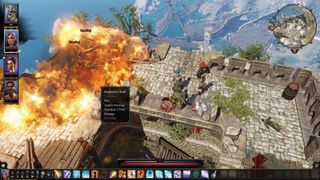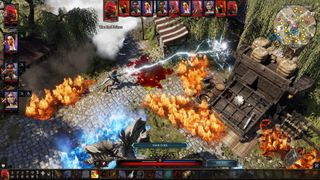It rules that Baldur's Gate 3 is turn-based
It's the only civilised way to play an RPG.

Like Andy, I used to be happy commanding parties of adventurers in real-time, haphazardly slapping my space bar to pause the action so I could untangle yet another mess. I gladly defended the system from elitist turn-based adherents, but that was the old unenlightened me. Forget about him. I now know the truth: turn-based is a far superior way to play something like Baldur's Gate 3. The elitists were right all along.
It's a system designed to create order out of chaos, turning the messiness of battle into something more elegant and civilised. It's the lightsaber of combat systems. Sure, maybe in the occasional real-time fight you'll be extremely organised, queue up a perfect combo of attacks and time everything just right, but most of the time you're just grabbing your party and flinging them at the enemy.
Maybe I've got you wrong, though, and you're all really very diligent in your management of your party, thinking tactically with a hand always hovering over the space bar. But in that case, why wouldn't you want a turn-based system that really rewards your tactical know-how?

With everything moving at once, there's a lot less room to put clever plans into action. Melee almost immediately devolves into a scrum, with the AI desperately trying to get a taste for blood. You might be able to get your own party to dial it back, but enemies are often far less restrained. To avoid getting all tangled up, you need to make constant tiny adjustments that don't feel nearly as meaningful as the actions you might make during a turn.
The old Infinity Engine games and Pillars of Eternity use the same principles and even specific abilities and rules from turn-based tabletop RPGs, but then obscures them to allow everything to flow in real-time. All the maths and dice rolls and single key moments still happen, but they're hidden away in a combat log and occur so quickly that you've got no time to make sense of them unless you effectively play it like a turn-based game.
I want the choices I make to stand out and to be able to point to something and say "that's what won the fight for me" without searching through a combat log to read some sums. It's easier to understand the underlying rules and dizzying array of numbers when you're going through things methodically. I've yet to see a RTWP game explain its combat system well, but the structure of turn-based games makes everything much easier to digest.

Being able to pick when you can pause the action might sound liberating, but to me it's become a weight around my neck. I find myself spending even more time paused than I would in a turn-based game, turning battles into slideshows until I get bored and just hope the AI can handle things without me for a few fights. When a character can take multiple hits and then die in a split second, that's risky.
The biggest gaming news, reviews and hardware deals
Keep up to date with the most important stories and the best deals, as picked by the PC Gamer team.
In an ARPG, where you're just needing to worry about a single character, real-time combat makes perfect sense, but Baldur's Gate is not Diablo. Adding the pause to it feels like a fix for something that wasn't broken. Real-time works perfectly well for single-character actions games, and turn-based is better when you're dealing with parties and rulesets that normally come in multiple books.
Tabletop games can be a bit dense, so it makes sense to attempt to streamline them a bit. A single dungeon might take a D&D group a whole session to fight through, but in videogames we expect to make progress faster. That's one of the main reasons I used to defend real-time with pause. I don't have time to play an RPG that size if the combat is as slow as its tabletop inspiration. But turn-based combat doesn't need to be slow, and it can be just as exciting as a real-time brawl.

What turn-based systems have that the alternative lacks is real tension. With real-time combat, you lose the tension of ending a turn with a sliver of health or letting a single roll of the dice decide the end of a fight—these moments all happen in the background instead. And since XCOM, turn-based fights have become a lot more flashy. Sometimes that means more cinematic attacks, but modern turn-based games have also made great strides when it comes to the pacing of their battles.
BattleTech, for instance, was updated with much faster turn speeds after it was criticised for being too slow at launch. Original Sin 2 set everything on fire, covering the battlefields in elemental surfaces that turned fights into deadly laboratories. Baldur's Gate 3, meanwhile, uses a simultaneous turn-based system that lets you move all of your characters—each of whom can move, attack and use bonus actions—at once. One of the results of this, according to Larian, is that you'll be able to finish up trash fights very quickly, letting you feel like a badass for blowing up a bunch of goblins without making you spend 15 minutes doing it.
Fire Emblem: Three Houses boasts one of my favourite solutions to the pace of turn-based battles. At the start of your turn, you can automate your entire army by giving them some broad orders. If none of them are close enough to attack an enemy, for instance, you can give them the charge order, making all of them home in on the closest foe. It cuts down on the time wasted on empty turns, and it comes in pretty handy when you're grinding a new class.

Pillars of Eternity 2 got an official turn-based mode a while back, and along with things like the Pathfinder: Kingmaker turn-based mod it was a real eye-opener. It felt like the game was designed for this, and that's because it kind of was. Pandering to the nostalgia of Baldur's Gate made Pathfinder and Pillars slightly poorer, albeit ones I still think are fantastic.
I stomached real-time with pause in Baldur's Gate because I had to, and maybe because as a wayward teen I didn't know any better. I also used a lot of cheats to get me through the gruelling ones. Then somewhere down the line I tricked myself into thinking I actually liked it. For decades! What can I say? Being Scottish makes me love an underdog.
But some underdogs are just crap. Real-time with pause is that kind of underdog.
What do you think? Vote in our Twitter poll below.
Let's settle this.February 28, 2020

Fraser is the UK online editor and has actually met The Internet in person. With over a decade of experience, he's been around the block a few times, serving as a freelancer, news editor and prolific reviewer. Strategy games have been a 30-year-long obsession, from tiny RTSs to sprawling political sims, and he never turns down the chance to rave about Total War or Crusader Kings. He's also been known to set up shop in the latest MMO and likes to wind down with an endlessly deep, systemic RPG. These days, when he's not editing, he can usually be found writing features that are 1,000 words too long or talking about his dog.
Most Popular




